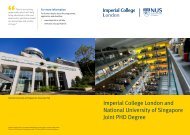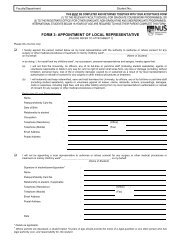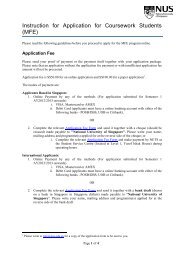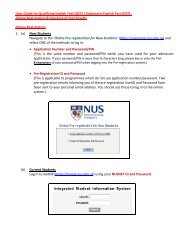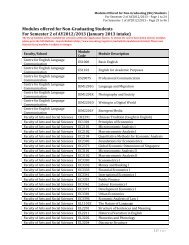engineering
engineering
engineering
You also want an ePaper? Increase the reach of your titles
YUMPU automatically turns print PDFs into web optimized ePapers that Google loves.
experiences. By providing graduates with a combination of<br />
broad-based fundamentals and specialised knowledge, the<br />
Bio<strong>engineering</strong> programme strives to graduate versatile<br />
engineers who would be best positioned to lead and be an<br />
integral part of the Bio<strong>engineering</strong> industries in the future.<br />
At the undergraduate level, the Division of<br />
Bio<strong>engineering</strong> offers a four-year <strong>engineering</strong> curriculum<br />
leading to a Bachelor of Engineering degree in<br />
Bio<strong>engineering</strong>. Design-based and research-based<br />
projects are an integral part of the curriculum. They help<br />
to develop the spirit of innovation and inquiry,<br />
integrative skills, and critical thinking skills in the<br />
students. A portion of the curriculum is also set aside<br />
for non <strong>engineering</strong> modules in areas such as<br />
<strong>engineering</strong> professionalism and human relations. These<br />
are intended to equip our graduates with the knowledge<br />
to function effectively in tomorrow’s workplace.<br />
Technical electives within the curriculum allow our<br />
students to explore areas of special interest which they<br />
do in their upper years. Students may choose to<br />
specialise in one of the following areas, namely (a)<br />
biomaterials/tissue <strong>engineering</strong>, (b) biomechanics and<br />
(c) biomedical electronics and imaging. These focus<br />
areas represent technology areas that are of particular<br />
significance to the industry.<br />
Students who major in Bio<strong>engineering</strong> but do not have<br />
GCE ‘A’ Level Biology and Chemistry or their equivalents<br />
are strongly recommended to read CM1417<br />
Fundamentals of Chemistry and LSM1301 General<br />
Biology in Semesters 1 and 2. This is a programme<br />
requirement but is not necessary for streaming, which is<br />
done at the end of year one.<br />
3.2.1.2 Degree Requirements<br />
Students in the Bachelor of Engineering (Bio<strong>engineering</strong>)<br />
Programme are required to fulfil the following<br />
requirements to graduate from the programme:<br />
• Complete a minimum of 163 MCs with a CAP ≥ 2.0;<br />
• Pass all modules in accordance with Table 3.2.1a;<br />
• Pass at least four modules of technical electives as<br />
listed in Table 3.2.1b;<br />
• To qualify for an area of focus, a student must<br />
pass at least 16 MCs from the chosen area of<br />
focus as given in Table 3.2.1b;<br />
• Satisfy all other requirements as prescribed by the<br />
Faculty of Engineering or the University.<br />
Table 3.2.1a: Summary of Modular Requirements<br />
and Credits<br />
Modular Requirements MCs<br />
UNIVERSITY LEVEL REQUIREMENTS 20<br />
General Education Modules (GEM)<br />
(at least one from Group B: Humanities and 8<br />
Social Sciences)<br />
Singapore Studies (SS) Module 4<br />
Breadth: Modules Outside Student’s Faculty 8<br />
UNRESTRICTED ELECTIVES 20<br />
PROGRAMME REQUIREMENTS<br />
Faculty Requirements: 10<br />
EG1413 Critical Thinking and Writing 4<br />
HR2002 Human Capital in Organizations 3<br />
…193…<br />
Modular Requirements MCs<br />
EG2401 Engineering Professionalism 3<br />
EG1471 English<br />
Foundation Requirements: 27<br />
MA1505 Mathematics I 4<br />
MA1506 Mathematics II 4<br />
EG1108 Electrical Engineering 3<br />
EG1109 Statics and Mechanics of Materials 4<br />
PC1431 Physics IE 4<br />
PC1432 Physics IIE 4<br />
CS1101C Programming Methodology 4<br />
Bio<strong>engineering</strong> Major Requirements<br />
BIE Core Subjects: 48<br />
BN2101 Principles of Bio<strong>engineering</strong> 4<br />
BN2201 Quantitative Physiology for<br />
Bioengineers<br />
4<br />
BN2202 Introduction to Biotransport 4<br />
BN3201 Introduction to Biomechanics 4<br />
BN3301 Introduction to Biomaterials 4<br />
BN3401 Biomedical Electronics and<br />
Systems<br />
BN3501 Equilibrium and Kinetic<br />
Bioprocesses<br />
CM1121 Basic Organic Chemistry or<br />
CM1501* Organic Chemistry for Engineers<br />
4<br />
EE2009 Signals 4<br />
LSM1401 + Fundamentals of Biochemistry or<br />
LSM1101 + Biochemistry of Biomolecules<br />
4<br />
LSM2103 Cell Biology 4<br />
MA3501 Mathematical Methods in<br />
Engineering<br />
4<br />
BIE Design and Project Modules: 22<br />
BN2203 Introduction to Bio<strong>engineering</strong><br />
Design<br />
4<br />
BN3101 Biomedical Engineering Design 6<br />
BN4101R B.Eng. Dissertation (over 2 semesters) 12<br />
BIE Electives:<br />
#<br />
Technical Electives<br />
(from the modules in Table 3.2.1b)<br />
-<br />
4<br />
4<br />
16<br />
Total 163<br />
# For students who have not passed or been exempted from the<br />
Qualifying English Test at the time of admission to the Faculty.<br />
* Students without GCE ‘A’ Level Chemistry or equivalent must read<br />
CM1417 Fundamentals of Chemistry as a prerequisite for CM1121<br />
Basic Organic Chemistry or CM1501 Organic Chemistry for<br />
Engineers.<br />
+ Students without GCE ‘A’ Level Biology or equivalent must read<br />
LSM1301 General Biology as a prerequisite for the Life Sciences<br />
modules.<br />
Table 3.2.1b: Bio<strong>engineering</strong> Electives groups<br />
according to Area of Focus † *<br />
Biomaterials/Tissue Engineering<br />
BN2001 Independent Study<br />
BN3402 Bio Analytical Methods in Bio<strong>engineering</strong><br />
BN4109 Special Topics in Bio<strong>engineering</strong><br />
BN4301 Principles of Tissue Engineering<br />
BN4403 Cellular Bio<strong>engineering</strong><br />
BN4404 Biomicroelectromechanical Systems –<br />
BioMEMs<br />
GI<br />
FASS<br />
BIZ<br />
SoC<br />
FoD<br />
SDE<br />
FoE<br />
NGS<br />
FoL<br />
YLLSoM<br />
FoS<br />
USP<br />
DUKE-NUS<br />
LKYSPP<br />
YSTCM<br />
TI<br />
Others



